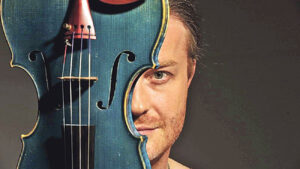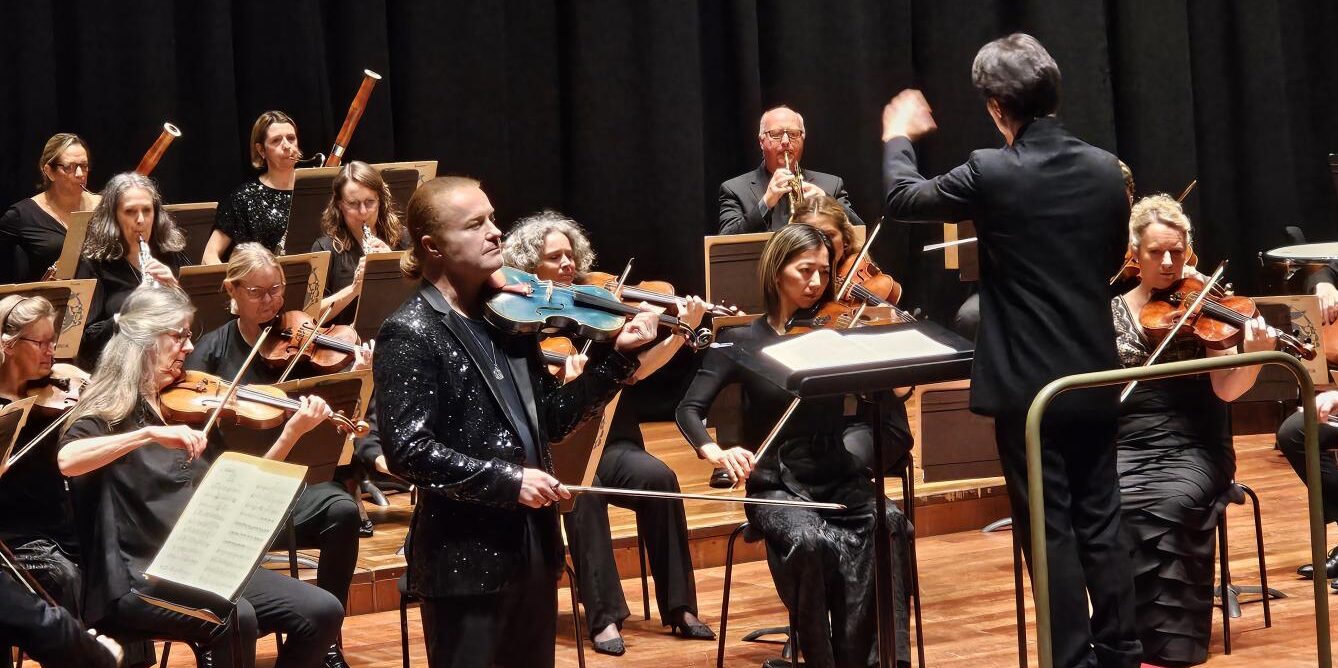Pavel Šporcl in conversation with Rivka Jacobson
An hour before Czech violin virtuoso Pavel Šporcl’s performance with the English Chamber Orchestra at the Queen Elizabeth Hall, Southbank Centre, on Saturday, 30th November, we met for a brief but inspired chat.
As part of the Year of Czech Music 2024, celebrated violinist Pavel Šporcl isn’t just honouring tradition—he’s redefining it. With his trademark blue violin and contemporary approach, he aims to prove that classical music is anything but stiff and exclusive. In this candid conversation, Pavel shares how he’s making classical music accessible, his roots in the Czech violin tradition, and why enthusiasm is key to keeping this art form alive.
Classical Music for Everyone
Pavel Šporcl is on a mission: to show that classical music belongs to everyone. “Before my blue violin, I was performing in jeans and a bandana,” Pavel recalls with a smile. “It felt like a teenager running free on stage. But eventually, I asked the renowned Czech violin maker Jan Špidlen to craft me a special blue violin—just for me. Next year, it will be 20 years since I started playing it!”
Why the blue violin? For Pavel, it symbolizes freedom from the constraints of tradition. “Classical music doesn’t have to be rigid,” he insists. “You can smile, show your emotions, or even cheer if you like something. My way of doing things is to show that enthusiasm and joy are part of the experience.”

Carrying the Legacy of Czech Violinists
Pavel is proud to be part of a long lineage of Czech violin virtuosos. “Our country has always had incredible violinists, dating back to the 19th century,” he explains. “Take Josef Slavík, a contemporary of Niccolò Paganini. They were friends and even played together. Chopin once said that Slavík was a better musician than Paganini!”
The strength of the Czech violin tradition comes, in part, from history. “In the old days, many schools didn’t have pianos,” Pavel says. “Teachers would often play the violin, which created a solid foundation for string instruments. Otakar Ševčík, one of the greatest violin pedagogues, developed a rigorous method of teaching that influenced violinists worldwide.”
Even today, the impact of Czech violinists resonates globally. “The great Yehudi Menuhin once said that the best musicians are Jews and Czechs,” Pavel shares proudly. “For such a small nation, we’ve contributed so much to music.”
Music is a Universal Language
Despite the challenges of modernizing classical music, Pavel remains optimistic. “Music is a universal language. Whether you’re in Europe, the Middle East, or anywhere else, music can touch hearts. It’s about starting young and making sure children experience music in a way that excites them.” Pavel’s passion for classical music is infectious, and his performances remind us that tradition and innovation can go hand in hand. As he continues to inspire audiences worldwide, his blue violin stands as a bold symbol: classical music is alive, vibrant, and for everyone.
The Magic of Live Performance
For Pavel, every concert is a unique, shared experience. “A composer has an idea, the interpreter adds understanding, and the audience gives the music its own life. Thousands of musical interpretations float above the audience—that’s the magic we all hope for.”
When asked what he looks forward to most in his concerts, Pavel doesn’t hesitate “There isn’t one specific moment—I look forward to the whole experience,” he says. “A concert is like a shared journey. The composer provides the blueprint, the performer adds interpretation, and the audience completes it. That’s the magic we all hope for.”
This magic was on full display at his recent concert at Queen Elizabeth Hall, a highlight of the Czech musical year. “It’s always an honour to bring Czech music to the world stage.”
Dvořák’s Violin Concerto: A Cherished Challenge
In reference to this concert, Pavel confesses that the highlight is Dvořák’s Violin Concerto, a work he holds close to his heart. “It is beautiful and challenging—not just technically, but stylistically. Dvořák, though a violist himself, wrote very demanding string music,” Pavel smiles and quotes the great violinist Josef Suk, who once said to Dvořák, “Dear grandfather, you made it a bit too complicated.” Yet, Pavel embraces this complexity. “I try to play it my way, hoping that Dvořák would have liked it.”
Growing Up in a Cultural Family
Pavel’s love for music was nurtured early. “I come from a very cultural family,” he recalls. “My father was an actor, and my mother, a teacher, practiced with me daily until I was 12. We fought a lot—I wanted to play fast, and she wanted me to play slowly! But I never wanted to quit; I just wanted to practice on my own terms.”
His brother, Petr Šporcl, a talented cellist, added to the musical atmosphere at home. “String instruments were always part of our family life,” he says.
In every note Pavel Šporcl plays, his passion, legacy, and vision for the future of classical music shine through. His blue violin continues to enchant audiences worldwide, reminding us that classical music is not just a tradition—it’s a living, evolving art form meant for everyone.
And the performance that followed our conversation? It was a masterclass in artistry—elevating, invigorating, and undeniably magical.

